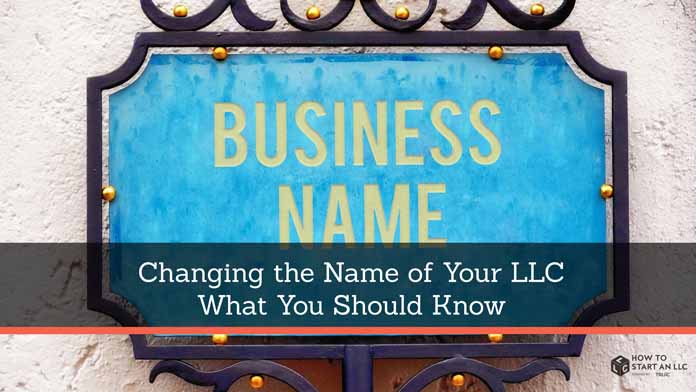Changing the Name of Your LLC
There are a variety of reasons why a business owner might want to change the name of their limited liability company (LLC). Refer to this article for the Steps to change the name of your LLC and when it is the best time for a business name change.

Reasons to Convert From an LLC to a Corporation
Business owners might consider converting from an LLC to a corporation for a variety of reasons. Here are some of the most common:
- You want to raise money from investors. Investors typically prefer to invest in corporations. Why? Because it’s easier to buy and sell stakes in corporations given their defined and transferable ownership shares. Corporations also have the ability to issue a separate class of shares called “preferred stock,” which investors often find attractive.
- You want to undertake a public offering. If you plan to someday conduct a public offering of common stock, you must first form a corporation.
- You want to issue stock as compensation. Whether you want to issue stock as compensation to initial investors or organizers, or you want to regularly issue it to employees as part of their regular compensation, it’s much easier to do so as a corporation than an LLC.
- You want to join a startup accelerator. Startup accelerators or incubators often take equity and therefore require companies to be incorporated.
- You want to lower your self-employment taxes. As an LLC, members must pay Social Security and Medicare taxes on their share of the entire company’s profits. In a corporation, owners receive payment like other employees and only have to pay these taxes on the amount of their compensation. Importantly, an LLC can choose to be taxed as a corporation without actually converting into one.
Reasons For a Name Change
You may decide to change the name of your limited liability company (LLC) for a variety of reasons. The most common reasons involve:
- Making a Correction: In some cases, you may simply need to correct the name of your LLC if a typographical error appears on your business registration forms.
- Avoiding Brand Confusion: If people often confuse your company with another business, your current business name could hinder your growth and sales. As such, it’s likely time to consider a new option.
- Supporting Growth or Changing Your Industry, Products, or Strategy: If your initial business name seems a bit limiting as your company grows, a broader name may now feel more appropriate. For example, consider a business that sells books and includes the word “books” in its business name. If that business starts to sell movies or provide other services beyond books, the owner may want to omit “books” from the company name. You also might consider a name change if you move into a completely new industry or if your business name references your local area and you expand beyond that city, state, or region.
- Updating a Legacy Name: If your company name references a person who left the company or passed away, the current name may no longer properly reflect the business. Some business names can, of course, far outlive their founders. Two great examples include The Walt Disney Company and Johnson & Johnson.
- Addressing a Trademark Issue: If your business name is too similar to that of another company operating in the same industry, a court may order you to change your name.
- Rebranding: In some situations, you may find it necessary to rebrand your business. For example, Google used to be called “Backrub.” Yet, telling people to “Backrub it” instead of “Google it” just doesn’t sound quite the same. If your business name is too generic, you may wish to choose a more memorable name to help you build brand awareness. If you believe a rebranding will benefit your company for other reasons, then that also may require a name change.
Consider Filing for a DBA
DBA stands for “doing business as” — also known as a fictitious name, trade name, or an assumed name in some states. Keep in mind that filing a DBA does not form a business, but instead forms a sole proprietorship. In some situations, an LLC may want to register a DBA. Perhaps your LLC name is JW Enterprises LLC, for example, but you’d like to do business under the name JW Books for your bookstore. JW Enterprises LLC could file for a DBA to use the name JW Books. JW Books becomes a “nickname” for JW Enterprises LLC, which remain the same company. If you don’t need a name change, filing for a DBA could be a good option.
Here are some key factors to consider as you evaluate whether or not your LLC should file for a DBA:
- Will your LLC operate and conduct business under its true and legal name? If the answer is “yes,” you don’t need a DBA. If the answer is “no,” then your LLC should file for a DBA.
- Are you running multiple businesses or microenterprises under one LLC? If the answer is “yes,” then filing for a DBA for each business could help you separate each business. However, you may want to consider forming a new LLC if your business continues to grow and expands its liability exposure.
- Does your LLC have multiple stores, each with different names? If so, this is another situation in which you may want to file for a DBA.
- Is your business a franchise? If you own a Taco BellTM franchise, for example, you’ll most likely form an LLC with a name of your choosing. However, as a franchise, you must use the Taco Bell name. That means your LLC would file for a DBA using the name Taco Bell. Keep in mind this is only possible because you have a franchise agreement to use Taco Bell’s name and trademark. You cannot file for a DBA that would infringe on someone else’s trademark.
These are just a few reasons you may consider filing for a DBA, you may have others. If you’re unsure whether or not you should file for a DBA, consult an attorney.
Rebranding: More Than a Name Change
Rebranding is more than just a name change — it involves changing your image and identity as a business and goes far beyond your logo design. In fact, your brand determines how people view your business and what they associate with your company.
So why might you consider rebranding your business?
Some common reasons include: mergers and acquisitions, repositioning the business, changing markets, addressing a scandal or bad reputation, expansion into other territories, updating an outdated image, a new CEO, a creative challenge, or an evolving brand portfolio. If you’re considering a rebranding — for whatever reason — be sure to carefully plan and execute your rebranding strategy beyond just taking a new name.
The Best Time to Change Your Business Name
Changing your business name can involve a significant amount of work so be sure to thoroughly consider every aspect of the change before you proceed. If you decide a name change is the right move for your business, the best time to make the change will depend on your assessment of the following key factors:
- Why are you considering a name change? Do you plan to enter a new market, do you need to resolve a trademark issue, or do you want to rebrand for another reason? If you’re required to change your business name, such as for trademark issues, then the best time to make the change is immediately after you receive the order to do so.
- What will the change cost? Beyond just amending your operating agreement or filing for a DBA, consider the costs of creating a new website, logo, letterhead, signage, and anything else that features your company name. Based on those estimated costs, are you financially able to change your business name?
- Have you weighed the pros and cons of changing your business name? Cons may include the cost and logistics of changing your business name, while the pros may include building (or rebuilding) consumer trust and/or growing your profits.
- Do you have a brand strategy? Make sure your new business name aligns with your company’s brand and brand promise.
In some cases, you may be required to change your business name and must do so as soon as possible. In other cases, you may believe rebranding will help grow your business. In those situations, the best time to change your business name is when the benefits outweigh the cost of rebranding based on your evaluation of the above factors.
Steps to Change the Name of Your LLC
If you’re ready to change your LLC’s business name, follow these key steps:
- Refer to your operating agreement. Your operating agreement may outline certain procedures you must follow in order to change the name of your LLC.
- Create a member resolution. Documenting your name change is important so you retain a written record.
- Change your name with the state. File the appropriate paperwork to change the name of your LLC with your state. This often involves filing an amendment to your articles of organization.
- Pay the filing fee. Most states charge a filing fee to process the paperwork associated with your business name change. While the fee can vary by state, it typically costs between $20 and $150.
- Change your name with the Internal Revenue Service. After you file your business name change with your state and receive state approval, you should file your name change with the IRS. The IRS has different requirements, depending on your business type, so be sure to visit the IRS website to check out any specific requirements that may apply to your LLC.
- Inform everyone of your name change. Be sure your customers and any other third parties with which you work — including vendors, banks, and credit card companies — know of your name change.
Summary
There are many reasons why you might consider changing the name of your LLC. If you evaluate the key factors and decide a name change is right for your business, be sure to follow the steps outlined above for a smooth transition. If you’re unsure about changing your business name, or need help with the process, consult an attorney.
NOTE: This article contains general legal information, but does not offer legal advice. Always consult an attorney for legal advice.


